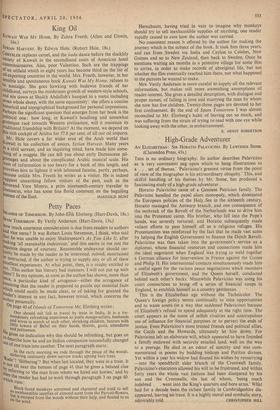Petty Paces
ROW much courteous consideration is due from readers to authors and vice versa? It was Robert Louis Stevenson, I think, who said lhat he was unable to enjoy Shakespeare's As You Like It, after making 'all reasonable endeavour,' and this seems to me just the requisite degree of courtesy. Reasonable endeavour should cer- Y be made by the reader to be interested, moved, entertained instructed, if the author is trying to supply any or all of these excellent experiences. At what point, then, is a reader entitled to `This author has literary bad manners. 1 will not put up with them'? the In my opinion, as soon as the author has shown, more than once , , a particular kind of arrogance—either the arrogance of s'nIng that the reader is prepared to puzzle out essential facts Which could easily be made clear, or of taking for granted the reader's interest in any fact, however trivial, which concerns the author personally.
Page 40 of l'slands of Tomorrow Mr. Elmberg writes : One should not fail to travel by train in India. It is a tre- nientilously refreshing experience to jostle mango-sellers, husbands and wives in search of each other, shrieking children, bearers with little towers of Babel on their heads, thieves, goats, attendants
th and policemen. oves no indication why this should be refreshing, but goes on t° gi describe how he and an Indian companion successfully changed ()tit of one train into another. The next paragraph starts : 11n the early morning we rode through the peace of the woods. ,„ Ithering cautiously down narrow tracks bare trees. "de'? 'Slithering'? But when last locatedthey were in a train. It Is not till near the bottom of page 41 that he gives a belated clue whby referring to 'the man from whom we hired our horses,' and by en the reader has had to. work through paragraph 3 on page 40, 1 runs : Black-faced monkeys screamed and chattered and tried to sell us Inexhaustible supplies of almond scent from the Parvati-flowers, but t escaped from the woods without their help, and floated to us I
on the wind. Hereabouts, having tried in vain to imagine why monkeys should try to sell inexhaustible supplies of anything, one reader rapidly ceased to care how the author was carried.
No consistent reason is offered by the author for making the journey which is the subject of the book. It took him three years, and rap from Sweden via India and Ceylon to Celebes, New Guinea and so to New Zealand, then back to Sweden. Once he mentions waiting six months in a primitive village for some film to arrive, in order to make records of aboriginal life, but not whether the film eventually reached him there, nor what happened to the pictures he wanted to make.
Mrs. Verily Anderson is more careful to supply all the relevant information, but makes still more astonishing assumptions of reader-interest. She gives a detailed description, with dialogue and proper names, of falling in love and marrying the man by whom she now has five children. Twenty-three pages are devoted to her first confinement. By the end of Spam Tomorrow I was almost reconciled to Mr. Elmberg's habit of leaving out so much, and was suffering from the strain of trying to read with one eye while looking away with the other, in embarrassment.
E. ARNOT ROBERTSON


















































 Previous page
Previous page